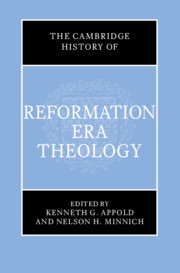Book contents
- The Cambridge History of Reformation-Era Theology
- The Cambridge History of Reformation-Era Theology
- Copyright page
- Contents
- Figures
- Acknowledgments
- Contributors
- Abbreviations
- Introduction
- Part One Theology in an Age of Cultural Transformation
- Part Two Schools and Emerging Cultures of Theology: Diversity and Conformity within Confessions
- 10 The Faculty of Theology of Paris (1474–1682)
- 11 The School of Salamanca
- 12 The Schools of Louvain and Douai: The Bible, Augustine, and Thomas
- 13 The Jesuit School of Theology
- 14 Theological Currents in Latin America (Sixteenth Century)
- 15 Diversity and Conformity within Early Lutheranism
- 16 Reformed Schools of Theology
- 17 Cultures of Theology in the British Isles
- 18 Radical and Dissenting Groups
- 19 Christian Ecumenical Efforts
- 20 Western “Confessions” and Eastern Christianity
- Part Three Topics and Disciplines of Theology
- Index
- References
15 - Diversity and Conformity within Early Lutheranism
from Part Two - Schools and Emerging Cultures of Theology: Diversity and Conformity within Confessions
Published online by Cambridge University Press: 27 September 2023
- The Cambridge History of Reformation-Era Theology
- The Cambridge History of Reformation-Era Theology
- Copyright page
- Contents
- Figures
- Acknowledgments
- Contributors
- Abbreviations
- Introduction
- Part One Theology in an Age of Cultural Transformation
- Part Two Schools and Emerging Cultures of Theology: Diversity and Conformity within Confessions
- 10 The Faculty of Theology of Paris (1474–1682)
- 11 The School of Salamanca
- 12 The Schools of Louvain and Douai: The Bible, Augustine, and Thomas
- 13 The Jesuit School of Theology
- 14 Theological Currents in Latin America (Sixteenth Century)
- 15 Diversity and Conformity within Early Lutheranism
- 16 Reformed Schools of Theology
- 17 Cultures of Theology in the British Isles
- 18 Radical and Dissenting Groups
- 19 Christian Ecumenical Efforts
- 20 Western “Confessions” and Eastern Christianity
- Part Three Topics and Disciplines of Theology
- Index
- References
Summary
One cannot write a history of theology1 without involving spiritual motives and concepts as constitutive impulses (principia) that have influenced and propelled the progress of history. Therefore, a history of theology does not need to be a classical history of ideas2 and may not exclude from its consideration historical facts, contexts, and human interests. It will instead always attempt to understand the historical rationality, the “meaning,” and relevance of theological concepts and to appreciate them as motives of the historical actors.
- Type
- Chapter
- Information
- The Cambridge History of Reformation Era Theology , pp. 248 - 287Publisher: Cambridge University PressPrint publication year: 2023

